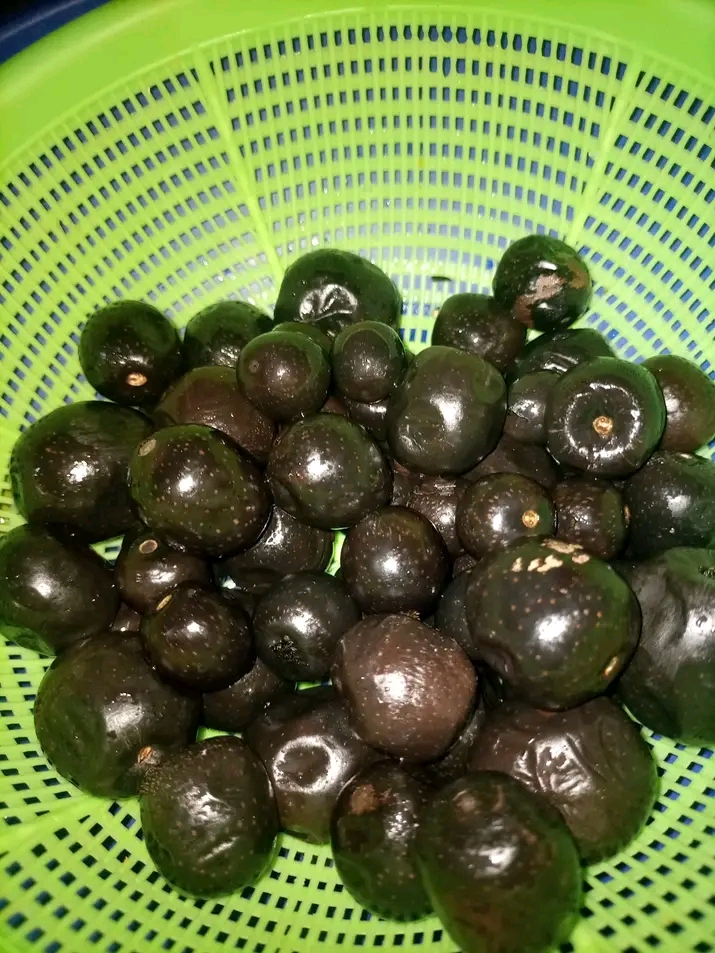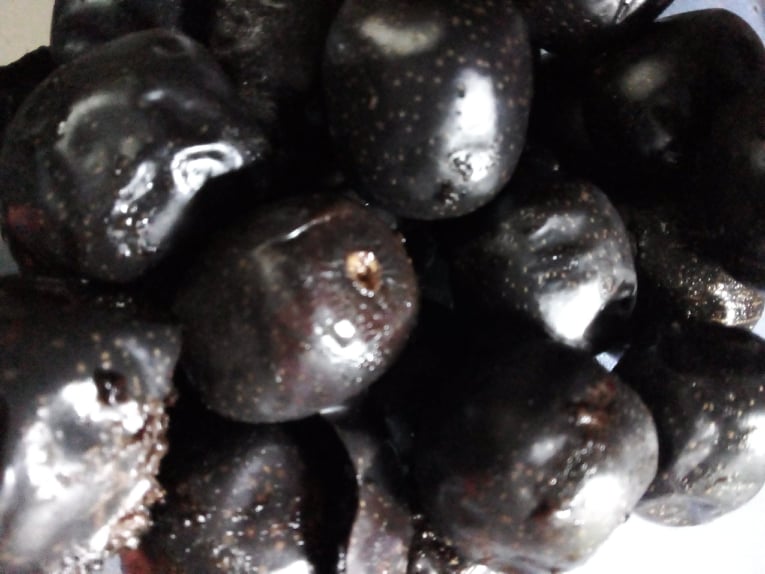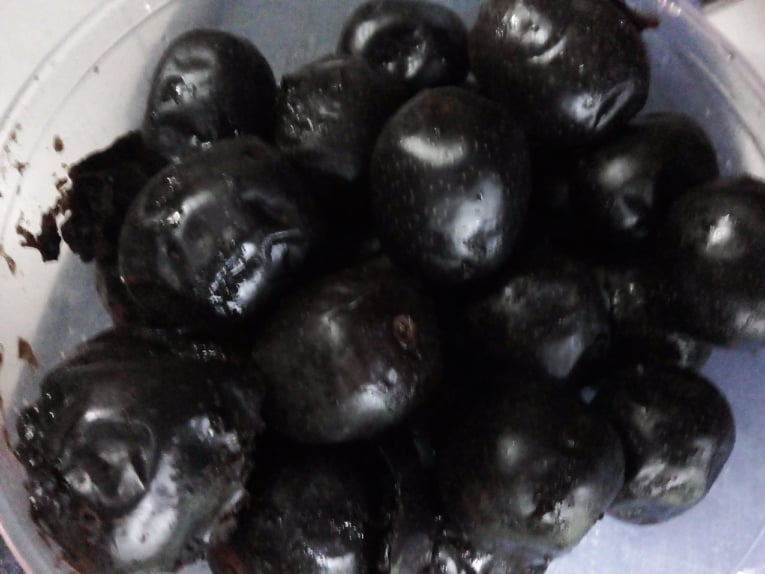Search Contents
Mbembe (Black Plum) Nutritional Value and Health Benefits – Lavenderish scent
I didn’t know about Mbembe or Uche akoro as people called it until this week. I used to give it out as the popular local pears known as Ube okpoko. But a cancer patient who losed one of her breasts recently through surgery mentioned it to me. She came to my house and told me how it was recommended for her and she ate it and her body was calmed through out the day and night. So, in this post, we will discuss Mbembe (African Black Plum) Nutritional Value and Health Benefits.
Mbembe (African Black Plum) Nutritional Value and Health Benefits
Black plum popularly known as Mbembe in the eastern part of Nigeria and other parts of west Africa is popular due to its high nutritional value. The black plum tree grows well in tropical climate areas of the world. This plant is considered one of the most important medicinal plants because of its huge health benefits.
Tropical countries in Africa have the black plum in abundance, countries like Nigeria, Cameroon, Ghana and many others consume it as a local fruit. In the 90s and early 2000s, it could be found nearly everywhere but due to human development and industrialization, the trees are now scarce, making them more difficult to get.
The black plum tastes very sweet and is oval in shape. When unripe, the colour is green. When ripe and ready to be consumed the colour changes to purple-black. Mbembe (African Black Plum) Nutritional Value and Health Benefits.
What Tree Bears Mbembe Ucheakuru or Black Plum?
“Mbembe fruit we call it in Igbo. Pronounced lavenderish scent and a rich succulent pulp that one could eat plenty of it feeling full stomach. As a child growing up in Asaba, I usually pick basins full of these velvet black plums (Mbembe) in nearby forests. You may read also: Uses of Sheep and Goat Feces (Poop) as Coffee and Drinks – True or False?
Nowadays, the forest have succumbed to city population pressure and the mbembe’s are no longer freely available. I know that there are a couple of trees belonging to my late uncle off Anwai road. But the ones in the picture, I stumbled at the Ugbolu farmers market. Properties of Wild Black Plum (Vitex … 12 Mar 2019 — The fruits (mbembe) are oblong drupe 2-3cm long, green when immature, turning purplish-black on ripening. They are usually eaten as snack.”
Where is Africa Black Plum found in Nigeria?
They are found in the bush and farm in all parts of Nigeria. You can find it in Yoruba or Hausa land. It has various local names among the major ethnic groups. In Hausa language, Black Plum or Mbembe is known as dinyar. In Fulani, it is called galbihi and in the Yoruba, it is known as ori nla. The Igbos call it Mbembe, Uche akoro or ucha koro.
Mbembe or black plum is found in the bush. It is in Nigeria and other African Countries. I know one of the bush markets in Enugu where it is found and sold. (Contact this number if you need Mbembe or black plum (+234 (09094499184).
Mbembe (African Black Plum) Nutritional Value and Health Benefits
About the Nutritional Value of Black Plum

Black plum is one of the most nutritious fruits in the world. It has many benefits like anti-ageing properties, immune system support, cardiovascular protection, cancer prevention, liver detoxification, digestive aid, brain power, weight loss and many more. These are some of the reasons why people consume black plums regularly. Here we discuss the nutritional value of black plum.
Vitamins & Minerals
Black plum is rich in nutrients, and here are some of the important nutrients it possesses: vitamin A, B, C, D, E, B6, K, folate, niacin, pantothenic acid, phosphorus, magnesium, manganese, copper, molybdenum, thiamine, riboflavin, folic acid, biotin, pyridoxine, ellagic acid, iodine, iron, zinc.
Black plum also contains proteins, carbohydrates, fats, fibres, water, and calories. Apart from this the fruit also contains omega 3 fatty acids, omega 6 fatty acids, dietary fibre, sodium and potassium, and other important elements.
Read Also:
Mbembe (African Black Plum) Nutritional Value and Health Benefits
Photos of Mbembe, Black Plum, dinyar, ori nla


14 Health Benefits of African Black Plum (Mbembe)
Here are the 14, benefits of eating the Black Plum otherwise known as “Mbembe”.
1. Reduces Blood Sugar Levels
Diabetes patients often suffer from high levels of sugar in their bloodstream. High blood sugar levels cause damage to organs and tissues, resulting in blindness, kidney failure, nerve damage, and amputation.
African Black Plum contains ellagic acids, which are potent natural compounds that prevent high glucose levels in the blood by blocking enzymes involved in carbohydrate digestion. Mbembe (African Black Plum) Nutritional Value and Health Benefits.
2. Prevents Kidney Stones
Kidneys play an essential role in maintaining proper fluid balance within our bodies. If the kidneys fail to excrete waste products properly, toxins accumulate in the bloodstream and form stones. These stones block the flow of urine and can lead to severe complications.
African Black Plum helps prevent kidney stones by inhibiting the formation of certain crystalline structures in the urinary tract.
Mbembe (African Black Plum) Nutritional Value and Health Benefits
3. Promotes Liver Health
A healthy liver plays a crucial role in regulating various metabolic functions. Excess accumulation of fatty substances in the liver causes inflammation, leading to serious conditions such as cirrhosis and cancer.
African Black Plum promotes liver detoxification by stimulating the bile secretion and enhancing the activity of liver enzymes. This results in the improved elimination of toxic chemicals from the body.
4. Improves Digestion
When food passes through our digestive system, it is broken down into smaller particles. Our gut bacteria then break down nutrients from the food. However, if food becomes too difficult for the stomach to digest, the bacteria cannot adequately metabolize the food. This leads to indigestion and bloating.
African Black Plum improves digestion by increasing the production of hydrochloric acid and gastric juices. It enhances peristalsis, the movement of muscles in the intestines, which aids in the breakdown of food.
Mbembe (African Black Plum) Nutritional Value and Health Benefits
5. Relieves Constipation
Constipation occurs when the intestinal lining becomes thickened due to prolonged exposure to faecal matter. This prevents water absorption and wastes from passing through the intestine.
African Black Plum stimulates bowel movements and reduces the number of faeces produced. It also acts as a laxative by promoting the release of fluids in the intestines. Mbembe (African Black Plum) Nutritional Value and Health Benefits
6. Treats Arthritis
Arthritis is caused by excessive buildup of cartilage in joints. Cartilage protects bones from rubbing against each other, but it does not repair itself after injury.
African Black Plum inhibits the growth of abnormal cells in the joint tissue, thus preventing further damage. It also relieves pain associated with arthritis.
7. Fights Inflammation
Inflammation is a normal response of the immune system to harmful stimuli. Chronic inflammation damages the body and makes it vulnerable to diseases such as cancer.
African Black Plumb slows down the rate of cell division and proliferation in the body, thereby reducing inflammation. It also regulates inflammatory responses, helping the body return to homeostasis.
8. Burns Fat
Fat accumulates in the abdominal area and thighs due to poor diet and lack of physical exercise. The extra fat clogs arteries, causing atherosclerosis, a condition characterized by plaque buildup in artery walls. Atherosclerotic plaque narrows the arteries and restricts blood supply to vital organs, leading to heart attacks, stroke, and peripheral vascular disease. Mbembe (African Black Plum) Nutritional Value and Health Benefits
African Black Plum burns fat by improving blood circulation and activating brown adipose tissue, a type of fat found in the abdomen. Brown fat produces heat instead of storing it as fat.
9. Boosts Metabolism
Our body’s ability to burn calories decreases with ageing. In order to maintain muscle mass and strength, we must consume enough calories to support our daily needs.
African Black Plum increases calorie burning by boosting thyroid hormone function. Thyroid hormones regulate the rate at which the body breaks down carbohydrates and fats.
Mbembe (African Black Plum) Nutritional Value and Health Benefits
10. Helps Lose Weight
Obesity is a major contributor to many chronic illnesses including heart disease, diabetes, and some cancers. Obesity also contributes to an increased risk of osteoarthritis, gout, sleep apnea, and gallbladder problems.
African Black Plum boosts metabolism by suppressing appetite and curbing cravings for sweets and junk food. Studies show that people who eat this fruit tend to eat fewer calories than those who do not eat them.
11. Protects Against Cancer
Cancer is one of the most common causes of death worldwide. Research shows that consuming African Black Plum regularly lowers the risk of developing breast, prostate, lung, colon, skin, and uterine cancers. It significantly reduces the risk of recurrence of cancer after treatment.
In addition, cancer patients who experience a crisis often should be taking it regularly, it will help reduce the effect of the crisis and give sustainable relief. Recently, a cancer patient shared her experience after consuming this fruit. She expressed satisfaction, adding that it helped her keep the effect of her crisis minimal.
12. Keeps Your Heart Healthy
Heart disease is one of the top killers in the United States. African Black Plum helps keep the heart healthy by lowering cholesterol levels and controlling blood pressure.
Studies suggest that eating African Black Plum regularly may reduce the risk of cardiovascular disease. Mbembe (African Black Plum) Nutritional Value and Health Benefits
13. Improves Sleep Quality
Poor quality of sleep can contribute to obesity, depression, anxiety, headaches, fatigue, and low self-esteem. African Black Plum helps promote restful sleep by relaxing the mind and easing tension.
It has been shown that regular consumption of African Black Plum improves sleep quality by reducing stress and anxiety.
Mbembe (African Black Plum) Nutritional Value and Health Benefits
14. Enhances Immune System
The human immune system consists of several parts that work together to protect us from illness. One component of the immune system is white blood cells called lymphocytes.
African Black Plum strengthens the immune system by stimulating the production of antibodies, the proteins that fight infection. Antibodies destroy invading pathogens so they cannot take hold in the body.
How to Eat Black Plum or Mbembe
Just leak and chew it with the back. Leak all the meat and throw away the hard seed.
Mbembe (African Black Plum) Nutritional Value and Health Benefits
The African black plum is a very good fruit with lots of medical benefits. As it is no longer common as it used to be, it will keep getting scarce as years go by. In Nigeria, it is available in the local markets and can be purchased for as low as $0.50 to $1 or more depending on the quantity. Years back, it was the “last hope” of a hungry child, that’s to say it was very common then.






